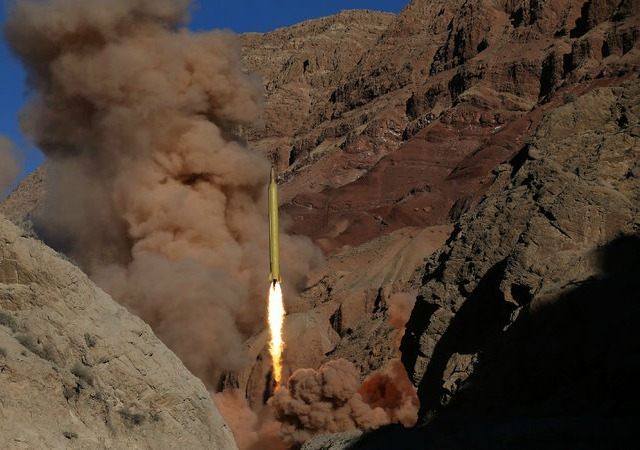Hard on the heels of its provocative missile tests Monday, a U.S. official told CNN Iran could launch an even more advanced 3-stage missile “at any minute.”
CNN compares such a vehicle to the rocket North Korea employed to launch a satellite last month, and notes a successful test “would give Iran further insights into intercontinental ballistic missile technology.”
The Obama administration has been trying to get the U.N. Security Council and European Union to sanction Iran for these ballistic missile tests, but so far the Obama team has been reduced to sputtering helplessly as Iran argues the tests do not actually violate Barack Obama’s nuclear deal and, in fact, the nuclear deal prevents the U.S. and its allies from taking steps to halt their missile research.
“Since we do not have nuclear warheads and we have undertaken not to develop them, and the international community has put in place the best mechanisms money can buy in order to make sure that we do not develop nuclear weapons… we do not design any missiles to carry things we do not have. So these missiles do not fall within the purview of (resolution) 2231 and they are not illegal,” argued Iranian foreign minister Javad Zarif, as quoted by CNN.
The European Union evidently agrees with this argument, with some reservations about how Iran “could raise tensions in an already volatile region” with such antics as writing, “Israel must be wiped off the Earth” in Hebrew on the side of missiles capable of hitting Tel Aviv.
Over at the United Nations, U.S. Ambassador Samantha Power fumed impotently about how “Russia seems to be lawyering its way to look for reasons not to act” against Iran.
What she means is that Russia and China, unlike most of the Obama administration, actually read the Iran nuclear deal and thought about how it interacts with U.N. security council resolutions. The U.N. resolution Power has been quoting merely “calls upon” Iran to avoid certain forms of ballistic missile research, rather than banning it outright, and the nuclear deal leaves the United States and its allies with little leverage against Iran to prevent such provocative behavior.
Also, as the Iranian foreign minister pointed out, the nuclear deal supposedly prevents them from developing the nuclear payload that would make ICBMs unacceptable, giving them a golden ticket to forge ahead with missile research, so their delivery systems will be ready when they “surprisingly” develop nuclear warheads, something even President Obama expects them to do within ten years.
Israel’s ambassador to the United Nations, Danny Danon, urged the Security Council to take “punitive measures” against Iran’s missile research. “We cannot and we will not bury our heads in the sand in the hope that the Ayatollahs act responsibly,” he warned.
Stopping Iran now may compromise European interests, if Iran’s newly opened economy is shuttered again with fresh sanctions. “Many European countries, as well as Russia and China, are building closer ties with Tehran and signing lucrative contracts in a variety of sectors, such as energy and the auto industry,” notes the Wall Street Journal.

COMMENTS
Please let us know if you're having issues with commenting.